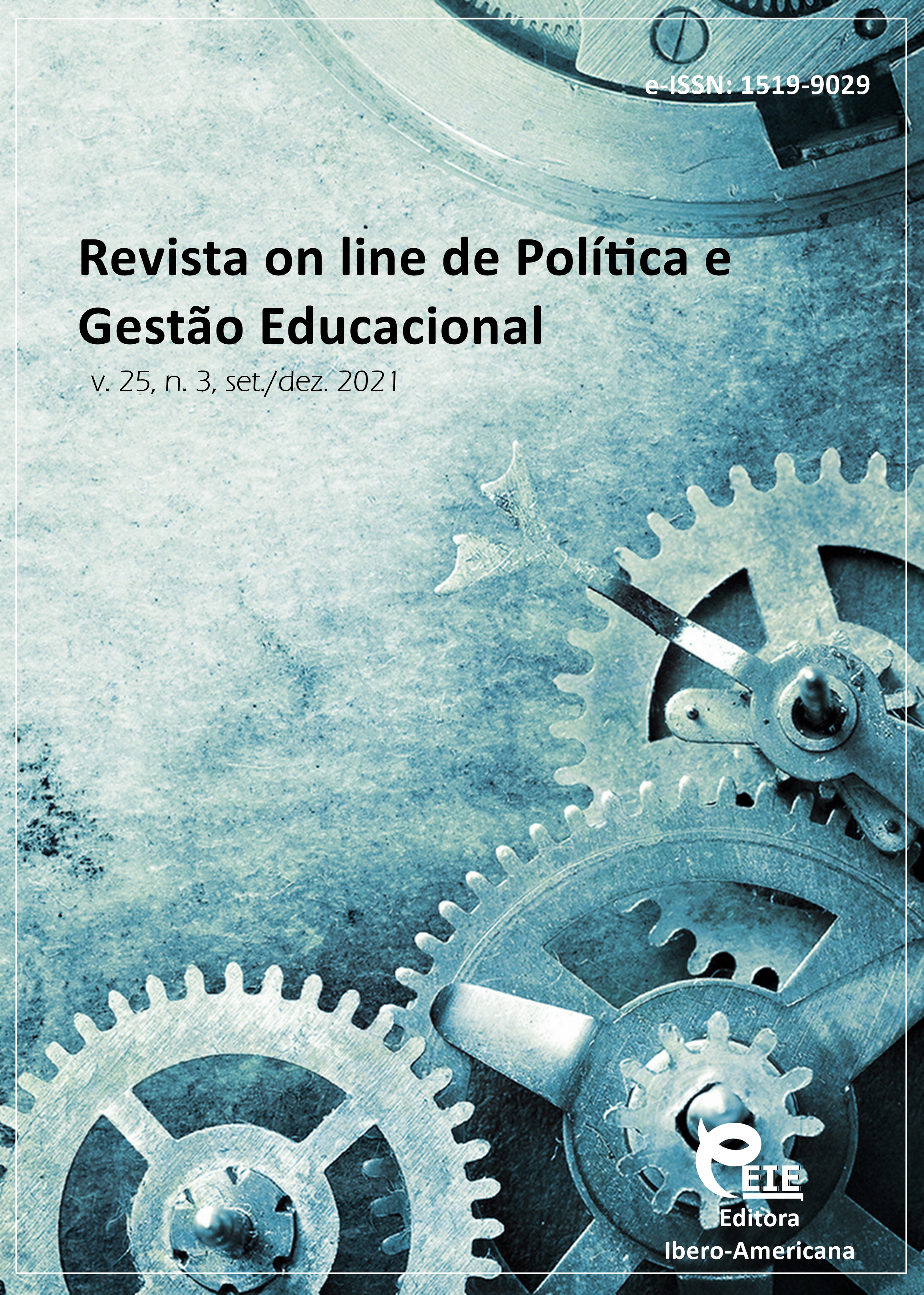Psychological and pedagogical foundations of preventive work in educational institutions
DOI:
https://doi.org/10.22633/rpge.v25i3.15922Keywords:
Teacher education, Deviation, AdolescentsAbstract
Theoretical analysis was used in this article to define the concepts of a teenager’s social deviation prevention and the degree of elaboration of the issue in question in the literature. Via modeling, the authors described sections of the psychological and pedagogical foundations of preventive work at school. Mathematical methods were used for processing and presenting the course fragment introduction results. General logical methods were applied for the work text design, conclusion formulation. Future teachers’ readiness for preventive work is characterized; the theory key points and methods of prevention of social deviations at schools are presented; the developed content introduction into work with students receiving pedagogical education with two educational profiles (majoring in “Primary Education and Life Safety”, based on material from the pedagogy course) is described; methodological recommendations for teaching the course are highlighted.
Downloads
References
ALVAREZ, Y. P.; DIAZ, Y. C. Formation of values in adolescents with affective behavior deviations. Avances, Pinar del Río, v. 21, n. 3, p. 344-355, 2019. Available: http://www.ciget.pinar.cu/ojs/index.php/publicaciones/article/view/453. Access: 8 Dec. 2021.
ALZHEV, D. V. Socialʹnaja pedagogika: konspekt lekcij [Social pedagogy: A textbook]. 2. ed. Saratov: Scientific Book, 2019.
ANDREEVA, O. I. et al. Profilaktika i razrešenie socialʹnyh konfliktov [Prevention and resolution of social conflicts]. St. Petersburg: St. Petersburg State Institute of Psychology and Social Work, 2011.
BABENKO, O.; KUZMINA, O.; YUSUPOVA, L. Extremism prevention at English classes with students. In: INTERNATIONAL TECHNOLOGY, EDUCATION AND DEVELOPMENT CONFERENCE, 10., 2016, Valencia. Proceedings […]. Valencia: IATED, 2016. p. 4275-4286. DOI: https://doi.org/10.21125/inted.2016.2062
BOROVSKAYA, H.; SEMJANNIKOV, S. The word as a means of preventing adolescents’ deviations. In: INTERNATIONAL FORUM ON TEACHER EDUCATION, 4., 2018, Kazan. Proceedings […]. Detroit: The European Proceedings of Social and Behavioural Sciences, 2018. p. 977-985. DOI: https://doi.org/10.15405/epsbs.2018.09.114
BULL, M.; RANE, H. Beyond faith: Social marginalisation and the prevention of radicalisation among young Muslim Australians. Critical Studies on Terrorism, London, v. 12, n. 2, p. 273-297, 2019. DOI: https://doi.org/10.1080/17539153.2018.1496781
CHVYAKIN, V. A.; KOZILOVA, L. V.; RATOVA, I. V. Patterny agressivnogo povedenija deviantnyh podrostkov kak obʺekt pedagogičeskogo issledovanija problem obŝestvennoj bezopasnosti [Patterns of aggressive behavior of deviant adolescents as an object of pedagogical research of public safety problems]. Pravo. Èkonomika. Bezopasnostʹ [Law. Economy. Safety], Moscow, v. 3, n. 9, p. 129-135, 2016.
ELISEEV, S.; VICENTIY, I.; GLUCHICH, V. Youth political extremism: Methods of early warning. Teorija in Praksa, Ljubljana, v. 54, n. 6, p. 990-1111, 2017. Available: https://www.fdv.uni-lj.si/docs/default-source/tip/politični-ekstremizem-med-mladimi-metode-zgodnjega-opozarjanja.pdf. Access: 9 Dec. 2021.
KALININA, N. V. et al. Psychological And Pedagogical Resources Of Security Provision And Prevention Of Internet Risks And Life Threats Among Children And Teenagers In The Educational Environment. Modern Journal of Language Teaching Methods, Istanbul, v. 8, n. 8, p. 118-129, 2018. DOI: https://doi.org/10.26655/mjltm.2018.8.1
KASATKINA, N. E.; RUDNEVA E. L. Pedagogika: kurs lekcij [Pedagogics: Course of lectures]. 3. ed. Kemerovo: Kemerovo State University, 2015.
KHODARAHIMI, S. Impulsivity, Aggression, and Psychopathic Deviation in a Sample of Iranian Adolescents and Young Adults: Gender Differences and Predictors. Journal of Forensic Psychology Practice, Philadelphia, v. 13, n. 5, p. 373-388, 2013. DOI: https://doi.org/10.1080/15228932.2013.829733
KONDRAT’EV, M. Y. Tipologičeskie osobennosti psihosocialʹnogo razvitija podrostkov [Typical deviations in adolescents’ psychosocial development]. Voprosy Psychologii [Questions of Psychology], Moscow, v. II, n. 3, p. 69-78, 1997. Available: http://www.voppsy.ru/journals_all/issues/1997/973/973069.htm. Access: 7 Dec. 2021.
KRYSHTANOVYCH, M. et al. Pedagogical and Psychological Aspects of the Implementation of Model of the Value Attitude to Health. BRAIN. Broad Research in Artificial Intelligence and Neuroscience, Iași, v. 11, n. 2, suppl. 1, p. 127-138, 2020. DOI: https://doi.org/10.18662/brain/11.2Sup1/99
KULGANOV, V. A.; KUZMICHEVA, I. V. Formy i pričiny deviantnogo povedenija podrostkov [Forms and causes of deviant behavior of adolescents]. Psihologija Obrazovanija v Polikulʹturnom Prostranstve [Psychology of Education in a Multicultural Space], v. 2, n. 3-4, p. 45-53, 2009.
NEVERKOVICH, S. D. et al. Students’ Internet Addiction: Study and prevention. EURASIA Journal of Mathematics, Science and Technology Education, Yelets, v. 14, n. 4, p. 1483-1495, 2018. https://doi.org/10.29333/ejmste/83723
OBOLENSKAYA, A. G. et al. Adolescent deviations, phenomenon of cybervandalism. Types. Prevention. In: INTERNATIONAL FORUM ON TEACHER EDUCATION, 4., 2018, Kazan. Proceedings […]. Detroit: The European Proceedings of Social and Behavioural Sciences, 2018. p. 283-294.
SHVEDCHIKOVA, Y. S.; BIKTAGIROVA, M. F. Sbornik metodičeskih materialov po organizacii profilaktičeskoj raboty na osnove rezulʹtatov socialʹno-psihologičeskogo testirovanija [Collection of methodological materials on the organization of preventive work based on the results of socio-psychological testing]. Perm: Center of Psychological-Pedagogical, Medical and Social Aid, 2020. Available: http://cppmsp59.ru/upload/iblock/ca0/ca0bc0285646cac8df09fff993b95ee0.pdf. Access: 8 Dec. 2021.
SLAVOVA, N. A.; CHVYAKIN, V. A. Moral Development in Structure of Legal and Cultural Organization of Adolescent Personality with Critical Social Deviations. Psychology and Law, Moscow, v. 9, n. 2, p. 264-275, 2019. DOI: https://doi.org/10.17759/psylaw.2019090218
TINUNTSEVA, G. N. Deviant behavior in adolescence. Irkutsk: Workshop, 2013.
ZMANOVSKAYA, E. V. Deviantologiya. Psihologiya otklonyayuschegosya povedeniya [Deviantology: Psychology of deviant behavior]. Moscow: Academia, 2003.
Published
How to Cite
Issue
Section
License
Copyright (c) 2021 Revista on line de Política e Gestão Educacional

This work is licensed under a Creative Commons Attribution-NonCommercial-ShareAlike 4.0 International License.
Manuscritos aceitos e publicados são de propriedade da Revista on line de Política e Gestão Educacional. É vedada a submissão integral ou parcial do manuscrito a qualquer outro periódico. A responsabilidade do conteúdo dos artigos é exclusiva dos autores. É vedada a tradução para outro idioma sem a autorização escrita do Editor ouvida a Comissão Editorial Científica.











